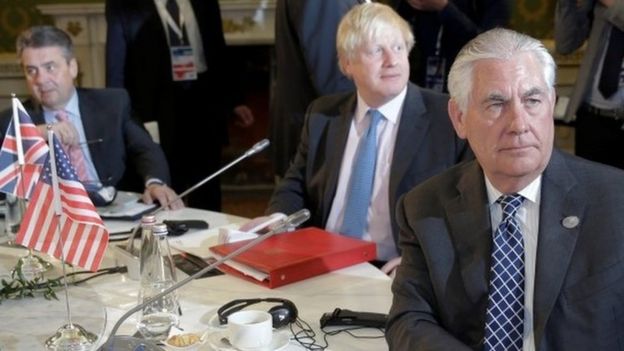G7 nations have rejected a call by Britain for sanctions against Russia in the wake of a deadly chemical attack they say was carried out by Moscow’s ally, Syria.
Italy’s foreign minister said the group did not want to back Russia into a corner and preferred dialogue.
US Secretary of State Rex Tillerson is now heading from the G7 meeting in Italy to talks in Moscow.
He insisted Syria’s president could not play a part in the country’s future.
Mr Tillerson will meet Russian counterpart Sergei Lavrov in Moscow but it is unclear whether he will hold talks with President Vladimir Putin.
On Tuesday, Mr Putin called for the UN to hold an independent investigation into the chemical attack on the rebel-held Syrian town of Khan Sheikhoun that left 89 people dead.
He also said he had heard that “fake chemical attacks” were being prepared that could be used to put blame on the Syrian government.
Syria denied carrying out the chemical attack but the US then carried out a retaliatory strike, firing 59 cruise missiles at a Syrian airbase.
UK Foreign Secretary Boris Johnson had proposed sanctions against Syrian and Russian military figures over the chemical attack.
BBC diplomatic correspondent James Robbins says Mr Johnson had hoped for some form of explicit support, but the final G7 communique does not mention sanctions.
Italian Foreign Minister Angelino Alfano – hosting the G7 talks in the city of Lucca – said ministers wanted to engage with Russia to put pressure on President Bashar al-Assad, adding that “we must not push Russia into a corner”.
“We think the Russians have the leverage that is needed to put pressure on Assad and to get him to observe the commitments with regard to the ceasefire,” he added.
Mr Tillerson said the US retaliatory strike “was necessary as a matter of US national security interest”.
“We do not want the regime’s uncontrolled stockpile of chemical weapons to fall into the hands of Isis [so-called Islamic State] or other terrorist groups who could and want to attack the United States or our allies.”
He also added that the US saw “no further role for the Assad regime longer term, given that they have effectively given up their legitimacy with these kinds of attacks”.
What will US achieve in Moscow – BBC’s Steve Rosenberg

The fact that Rex Tillerson’s visit to Moscow is happening at all is telling.
Russia reacted angrily to last week’s US missile strike on Syria, condemning it as an “act of aggression”. Yet Moscow is happy to host the US secretary of state. He’ll meet his Russian counterpart Sergei Lavrov and a meeting with President Putin cannot be ruled out.
But experience shows that Moscow does not take well to threats or ultimatums.
If Mr Tillerson thinks he can weaken Moscow’s support for President Assad, he may need to re-think. The Syrian president is Russia’s key military ally in the Middle East. Russia has invested heavily – militarily, politically and financially – to keep him in power.
New details on chemical attack and retaliation
Reports on Monday quoted a senior US official as saying that the Russians knew of the chemical attack because a drone had been flying over a hospital in Khan Sheikhoun as victims sought help.
Hours later a jet bombed the hospital in what the US believed was an attempt to cover up the attack, the Associated Press agency said.
Meanwhile, US Defence Secretary James Mattis gave fresh details on the retaliatory strike against Syria’s Shayrat airbase.
He said the “measured response” by the US had “resulted in the damage or destruction of fuel and ammunition sites, air defence capabilities and 20% of Syria’s operational aircraft”.
The Syrian military admits significant material damage but a Russian defence ministry spokesman said only six Syrian Air Force MiG-23s, plus a number of buildings, were destroyed and that only 23 of the missiles had reached Shayrat.
What is the US policy on Syria?
In recent days there have been mixed messages from the US on its priorities in Syria.
Mr Tillerson said on Sunday that there had been “no change to our military posture” in Syria following the US airbase strike and that Washington’s “first priority” was to defeat so-called Islamic State (IS).
There was further confusion on Monday. Mr Tillerson spoke in public about an interventionist approach, saying: “We rededicate ourselves to holding to account any and all who commit crimes against the innocents anywhere in the world.”
Hours later, White House press secretary Sean Spicer suggested Mr Trump would act against Syria not just if it used chemical munitions.
“If you gas a baby, if you put a barrel bomb into innocent people, I think you will see a response from this president,” Mr Spicer said in his daily briefing. The White House later said Mr Spicer had meant to refer to barrel bombs containing “industrial chemicals”.
Source – BBC